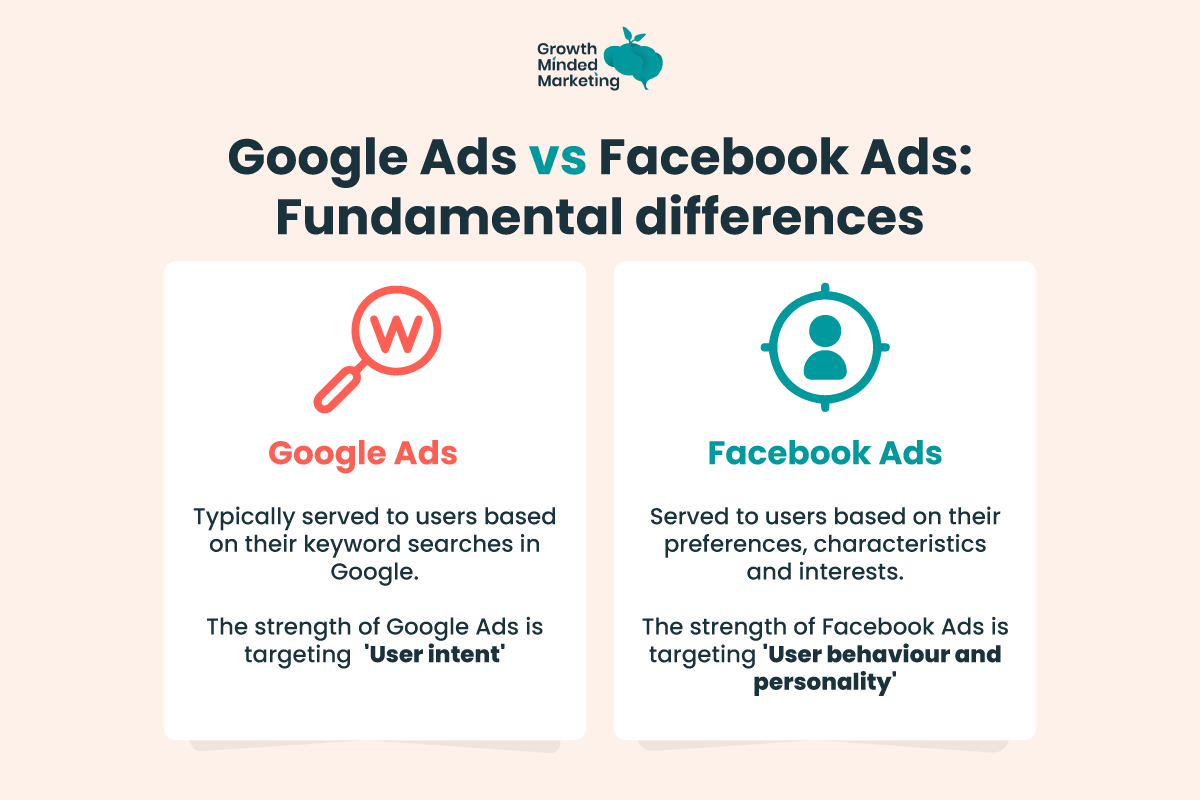
In the ever-evolving world of digital marketing, businesses are constantly seeking ways to get the most return on their advertising investment. One of the most common comparisons in this space is Google Ads vs Facebook Ads. Both platforms offer unique advantages and have become essential tools in digital marketing campaigns. But which one truly delivers better ROI (Return on Investment)?
In this blog post, we will explore the key differences, strengths, and use cases of both Google Ads and Facebook Ads, helping you make a more informed decision based on your business goals.
Understanding the Basics: Google Ads vs Facebook Ads
Before we dive into ROI specifics, it’s important to understand what each platform does:
What is Google Ads?
Google Ads is a pay-per-click (PPC) advertising platform that allows advertisers to show their ads in Google search results, YouTube, and across the Google Display Network. It’s intent-based, meaning ads are shown to users actively searching for specific products or services.
What is Facebook Ads?
Facebook Ads, on the other hand, operates within the Meta ecosystem (Facebook, Instagram, Messenger). It allows advertisers to target users based on interests, behaviors, demographics, and more. It’s interest-based, often reaching users who may not be actively looking for a product but fit the profile of an ideal customer.
Google Ads vs Facebook Ads: Targeting Capabilities
Google Ads
- Keyword targeting
- Location and device targeting
- Audience segments (custom intent, affinity, etc.)
Facebook Ads
- Interest and behavior targeting
- Demographic and psychographic segmentation
- Lookalike audiences based on existing data
Google Ads and Facebook Ads targeting ultimately depends on your audience’s search intent vs browsing behavior.
Cost Comparison: Which Is More Budget-Friendly?
The average cost-per-click (CPC) can vary significantly between the two:
Google Ads
- Higher CPC due to keyword competition
- Better for high-intent users
Facebook Ads
- Lower CPC and CPM (cost per 1,000 impressions)
- Effective for brand awareness and retargeting
When comparing Google Ads vs Facebook Ads in terms of cost-efficiency, Facebook often wins for reach, but Google may deliver higher conversion intent.
Conversion Rates and ROI Analysis
Google Ads
- High conversion rates for search-based ads
- Works well for bottom-of-the-funnel traffic
Facebook Ads
- Lower direct conversion but effective in nurturing leads
- Excellent for top- and mid-funnel campaigns
So, when thinking about Google Ads vs Facebook Ads and ROI, consider where your customer is in the buying journey.
Google Ads: Best Use Cases
- Local businesses targeting “near me” searches
- E-commerce stores with high-demand products
- Service-based businesses with clear search intent (e.g., “emergency plumber in Delhi”)
Google Ads are highly effective when users are already searching for what you offer.
Facebook Ads: Best Use Cases
- Brand awareness campaigns
- Product launches or limited-time offers
- Building email lists and lead generation
Facebook Ads shine when building trust, community, and remarketing to warm audiences.
Google Ads vs Facebook Ads: Analytics and Reporting
Both platforms offer robust analytics, but their focus differs:
Google Ads
- Conversion tracking through Google Analytics
- Real-time keyword performance data
- Call tracking for local businesses
Facebook Ads
- Pixel-based tracking on websites
- Advanced breakdowns by demographic
- Funnel tracking via Meta Business Suite
Understanding metrics is essential when evaluating Google Ads and Facebook Ads performance and ROI.
Ad Formats and Creative Flexibility
Google Ads
- Text ads, shopping ads, responsive display ads, video ads (YouTube)
- Limited visual appeal in search ads
Facebook Ads
- Image, video, carousel, slideshow, instant experience, and more
- Highly visual and interactive formats
Facebook offers more room for storytelling and brand expression compared to Google’s text-heavy formats.
Retargeting Options
Both platforms allow you to re-engage with visitors:
Google Ads
- Remarketing via Display Network and YouTube
- Customer Match and dynamic remarketing
Facebook Ads
- Retargeting via Pixel and custom audiences
- Strong performance in abandoned cart and product views
Retargeting is a powerful tool on both platforms. When deciding between Google Ads vs Facebook Ads, your remarketing strategy should align with your sales funnel.
Mobile Advertising Performance
With most traffic coming from mobile, both platforms excel:
Google Ads
- Optimized for mobile-first search
- Call extensions for immediate conversions
Facebook Ads
- Full-screen formats like Stories and Reels
- Instant experiences tailored to mobile
Mobile experience can significantly affect the ROI comparison between Google Ads and Facebook Ads.
Final Verdict: Google Ads vs Facebook Ads – Which Should You Choose?
The truth is, both platforms can deliver great ROI when used strategically:
- Choose Google Ads for high-intent, immediate conversions
- Choose Facebook Ads for broad awareness, brand loyalty, and lead nurturing
For many businesses, the best approach is using both together—Google Ads for bottom-of-funnel sales and Facebook Ads for top-of-funnel engagement.
Conclusion: Find the Right Ad Mix for Maximum ROI
There’s no one-size-fits-all winner in the Google Ads vs Facebook Ads debate. The right choice depends on your business goals, audience behavior, and budget.
🎯 Ready to maximize your ad performance?
Consider working with a digital marketing agency that understands both platforms in depth and can tailor a cross-channel strategy that fits your needs.
